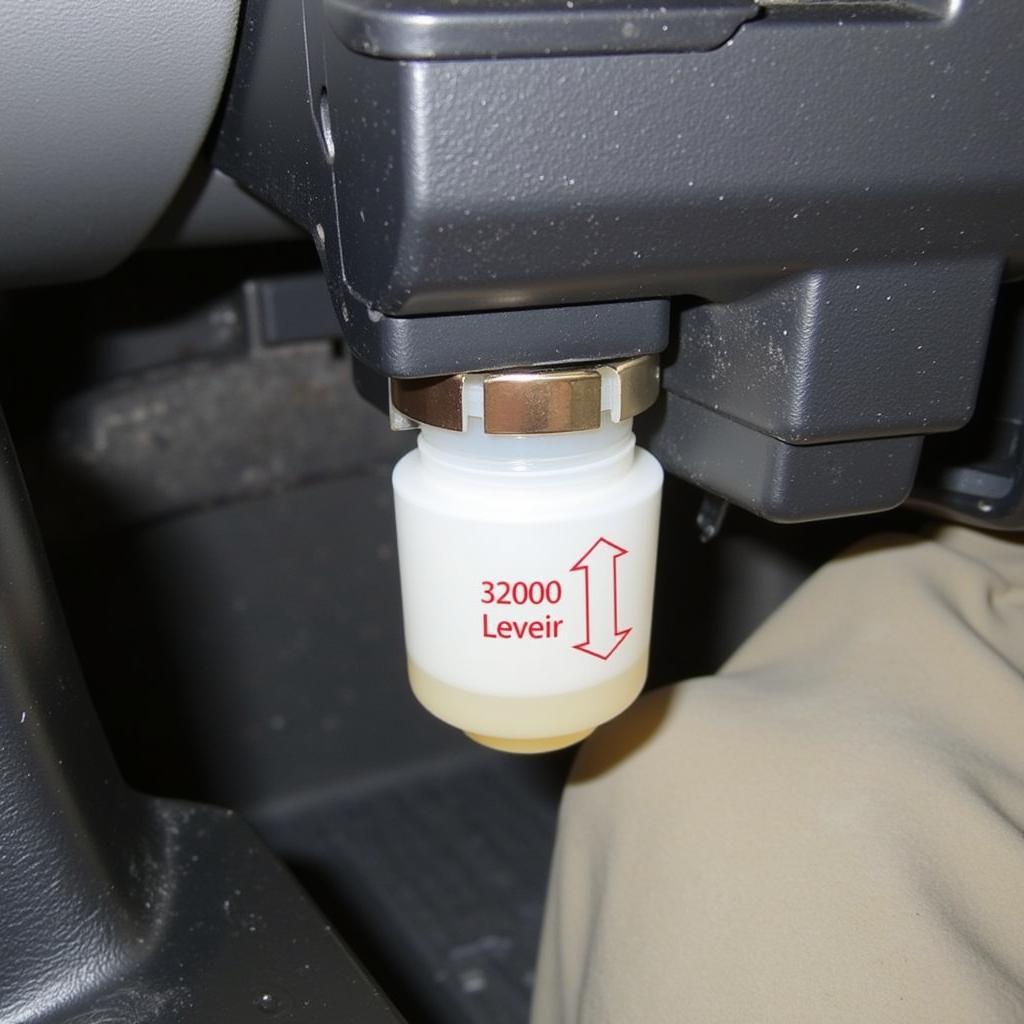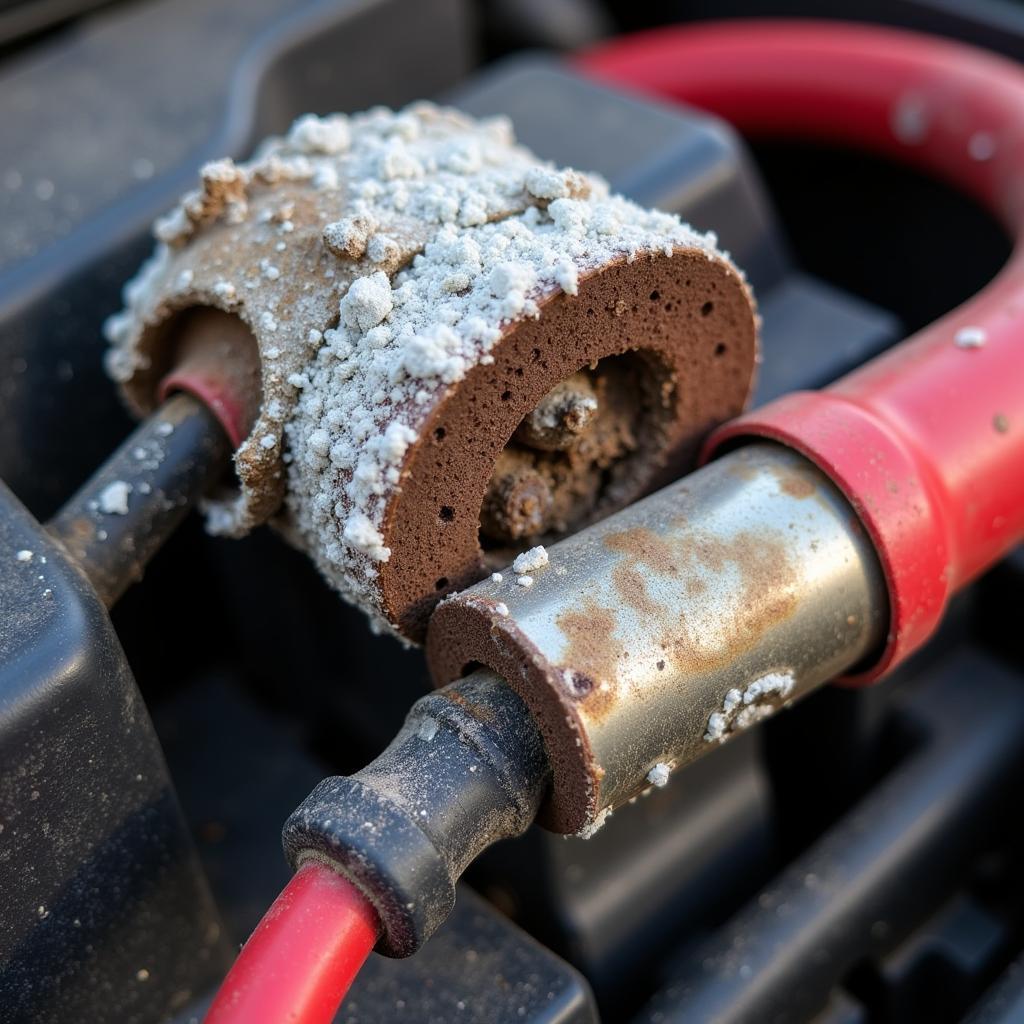The 2004 Hyundai Accent brake warning light can illuminate for several reasons, ranging from a simple issue like low brake fluid to more complex problems like a malfunctioning ABS system. Understanding what triggers this warning light and how to address it is crucial for maintaining your vehicle’s safety and performance. This comprehensive guide will walk you through the potential causes, diagnostic procedures, and solutions for a 2004 Hyundai Accent brake warning light.
Understanding Your 2004 Hyundai Accent Brake System
The braking system in your 2004 Hyundai Accent is a complex network of components working together to ensure safe and efficient stopping power. It includes the master cylinder, brake lines, calipers, rotors, drums, shoes, and the all-important brake fluid. The brake warning light acts as your vehicle’s first line of communication, alerting you to potential issues within this system.
Common Causes of the Brake Warning Light
The brake warning light in your 2004 Hyundai Accent can be triggered by several factors. The most common culprits include:
- Low Brake Fluid: This is the most frequent cause. Over time, brake pads wear down, and the brake fluid level drops.
- Worn Brake Pads: Thin brake pads can trigger the warning light. Regular brake inspections are essential to catch this before it becomes a safety hazard.
- Faulty Brake Light Switch: The brake light switch is responsible for activating the brake lights when you press the pedal. A malfunctioning switch can also illuminate the brake warning light.
- ABS Issues: If there’s a problem with the Anti-lock Braking System (ABS), the warning light will illuminate. This typically requires professional diagnosis.
- Parking Brake Engaged: While seemingly obvious, it’s easy to overlook. Make sure the parking brake is fully disengaged.
 2004 Hyundai Accent Low Brake Fluid Level
2004 Hyundai Accent Low Brake Fluid Level
Diagnosing the Problem: A Step-by-Step Guide
Here’s a step-by-step guide to help you pinpoint the issue:
- Check the Parking Brake: Ensure the parking brake is fully released.
- Inspect Brake Fluid Level: Open the hood and locate the brake fluid reservoir. Check the fluid level against the minimum and maximum markings. If it’s low, add the correct type of brake fluid.
- Visually Inspect Brake Pads: If possible, take a look at your brake pads. If they appear thin, it’s time for a replacement.
- Test the Brake Light Switch: Have someone observe the brake lights while you press the pedal. If they don’t illuminate, the switch might be faulty.
When to Seek Professional Help
While some issues can be addressed with simple DIY fixes, others require professional expertise. If you’ve checked the basics and the warning light persists, or if you suspect an ABS problem, it’s best to take your 2004 Hyundai Accent to a qualified mechanic. They have the diagnostic tools and expertise to identify and resolve complex brake system issues.
“Ignoring a brake warning light can be dangerous,” says John Miller, a seasoned automotive technician with over 20 years of experience. “It’s always best to err on the side of caution and have a professional diagnose the problem.”
Solutions for a 2004 Hyundai Accent Brake Warning Light
Once the cause is identified, the appropriate solution can be implemented. This might involve:
- Adding Brake Fluid: If the fluid level is low, top it off with the correct type of brake fluid. Remember to check for leaks if the level drops frequently.
- Replacing Brake Pads: Worn brake pads need to be replaced to maintain safe braking performance.
- Repairing or Replacing the Brake Light Switch: A faulty brake light switch will need to be repaired or replaced.
- Addressing ABS Issues: ABS problems often require specialized diagnostic equipment and expertise. A mechanic can pinpoint and fix the issue.
Conclusion
The 2004 Hyundai Accent brake warning light serves a vital purpose in alerting you to potential problems with your braking system. Understanding its causes and taking prompt action can prevent serious safety hazards. By following the steps outlined in this guide, you can troubleshoot the issue and ensure your vehicle’s braking system remains in optimal condition. If you’re unsure about any aspect of the diagnosis or repair process, it’s always best to consult a qualified mechanic. Remember, a properly functioning brake system is paramount for your safety on the road.
“Regular maintenance is key to preventing brake system problems,” adds Miller. “A simple brake inspection every few months can save you from costly repairs and keep you safe on the road.”
FAQ
- What does the 2004 Hyundai Accent brake warning light mean? It indicates a potential problem within your brake system.
- Can I drive with the brake warning light on? It’s not recommended. It could indicate a serious safety issue.
- How often should I check my brake fluid? Check your brake fluid level at least once a month.
- How much does it cost to replace brake pads on a 2004 Hyundai Accent? The cost varies depending on the type of brake pads and labor rates.
- What is the ABS system? The Anti-lock Braking System (ABS) prevents wheel lockup during hard braking.
- How do I know if my brake light switch is faulty? If your brake lights don’t illuminate when you press the pedal, the switch might be faulty.
- Where can I find a qualified mechanic to diagnose my 2004 Hyundai Accent’s brake system? You can search online for reputable mechanics in your area.

